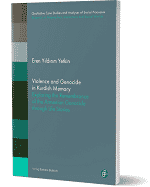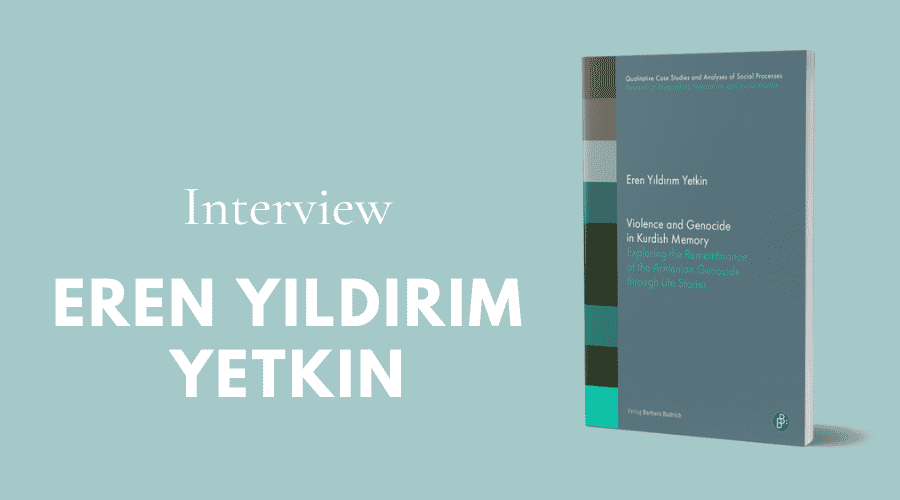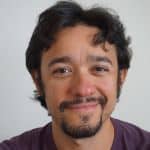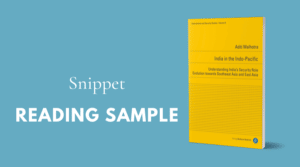
New with Budrich:
About the book
Kurdish memories of the Armenian Genocide challenge the systematic denialism established by the Turkish state structures and foster new possibilities of coming to terms with the past. This book examines Kurdish biographies, especially from Van, Turkey, and explores the dynamics of intertwined remembrance regimes concerning the political violence on Armenians and Syriac Christians of Ottoman imperial subjects and on Kurdish citizens of Turkey. These life stories shed light on the complexity of remembering, including collective and individual memory of violence, perpetration, and victimhood from past and present.
Dear Eren Yıldırım Yetkin, in your book you examine Kurdish biographies and explore the dynamics of intertwined remembrance regimes concerning the political violence on Armenians and Syriac Christians of Ottoman imperial subjects and on Kurdish citizens of Turkey. Which questions do you exactly tackle?
In my book, I discuss Kurdish collective and individual memories of political violence performed by state structures in Turkey. The study sets a particular focus on Kurdish narratives from the city of Van in North Kurdistan, former West Armenia, within the borders of the nation-state of Turkey. Until the genocide of 1915, the region of Van was distinguished by its Armenian and Assyrian presence. However, what Van experienced in those years was entirely different from what other areas had witnessed. For Van was the stage for the successful resistance of Vanetsis, the Armenians of Van. Nevertheless, the city of Van was reduced to rubble. The act of resistance is still remembered, in apologetic fashion by Turkey’s denialists who try to legitimize the genocidal actions, and as a legendary heroic act of defiance in Armenian memory.
At this juncture, I ask: What do Kurds, who constitute the majority of the city and the region today and whose ancestors were possibly actors at genocidal events – as helpers, victims, perpetrators, or bystanders – remember? In a more specific way, my study revolves around how the genocidal past and the experience of violence are reflected in memories in different contexts, like in narrating personal or family stories or political settings, and how people talk about state violence and the Armenian past?
Concerning these questions, I conducted autobiographical narrative interviews with politically active Kurds, which helped me to find out experiences, narratives, and perspectives I did not reckon until that day. Since remembering is not just about past experiences and history but is a type of meaning-making effort that targets the present day and imagined future scenarios; life stories and biographical trajectories were of importance in understanding issues related to individual and collective memories.
What was the impetus for addressing these topics?
The drive to explore the issues sprung from two primary sources: one related to my personal background, and the other, to the interdisciplinary fields of memory and genocide studies.
For approximately five years until 2010, eastern parts of North Kurdistan, from the city of Van to Mount Ararat, were a part of the area I worked professionally as a trekking and mountaineering tour guide. My job allowed me to travel to places that were unknown to the broader public. Among them were ruins of former Armenian villages and monasteries. I had asked myself: What does it mean for memory regimes to have sacred Christian buildings violated, ruined by treasure hunters because of stories circulated about lost Armenian gold; or why former Armenian villages were now inhabited by Kurds – and in case of Western Turkey, why it was the Turks who lived now in houses and places that once belonged to Christians like Greek Orthodox of Minor Asia and Armenians … However, the questions that once haunted my mind were put into perspective only when I was confronted with the literature on Armenian Genocide.
In Turkey, those years were shaped by debates about coming to terms with the past. Ground-breaking books were published one after the other. These may paint a rosy picture, but no, the reality was that, even during that epoch, intellectuals who offered a critical outlook were threatened with prosecution. Military operations continued in full force on the Kurdish periphery and across the Iraqi border. The state-orchestrated assassination of the Istanbul Armenian journalist Hrant Dink in 2007 was another significant event that marked the era. By the time I started writing my dissertation proposal in 2013/14, an ongoing peace and normalization process had raised hopes. Yet, on an academic and political level, while we were critically examining the country’s foundations, accounts in situ, like life stories, were sorely missing.
With your book and the presentation of Kurdish memories, you also challenge Turkey’s systematic denial of the Armenian Genocide. To what extent has this influenced your research, was it difficult to find people who are willing to speak openly about the genocide?
In my opinion, it is not me who challenges the Turkish State’s denialist structures operating to oppress the voices raised against the current repression on Kurds and historical violence against Armenians.
My interview partners who allowed me to listen to their life stories and the gatekeepers who connected me to the field, the curators who launched splendid exhibits about Armenian history, journalists who reported violent events in Kurdistan, and, of course, scholars who continue to live in Turkey and conduct critical research, whether it be archival or on the field … they are the ones who challenge the state narrative in the truest sense. Without their presence and contribution, I could not even imagine having written Violence and Genocide in Kurdish Memory. What I did was further questioning, exploring, and contextualizing the dynamics of remembering that emerge in Kurdish collective contexts.
As I mentioned before, I had submitted my project proposal in a climate defined by a then-ongoing peace and normalization process, which we now, in a retrospective fashion, can call an ambiguous one. When the Turkish state structures and the AKP government saw a sort of threat in having HDP in the parliament after June 2015 elections, political violence, state-orchestrated operations, mass detentions, inhumane curfews, in short, a war that resulted in the utter devastation of the urban spaces of Kurdish towns like Cizre and Gever, and the displacement of thousands of people quickly replaced that liberal climate and the hope that had emerged during negotiations.
So, the indicator for silence was linked more to the contemporary war than the systematic denial of the genocide. But even that did not implicate an either/or situation, like you remember either the Armenian Genocide or the state violence which has been targeting Kurds. The narrative interviews I collected showed me the complexity of the genocide memory in North Kurdistan and the interwoven nature of remembering.
Could you say something more about the field work and the research process?
My academic socialization took place in the field of interpretative sociology, like works by Anselm Strauss and Fritz Schütze were profoundly inspiring. In these terms, the field influenced the direction of my project. It led me to gather data from other places and contexts that I was unfamiliar with.
The original idea was to conduct my field research in the periphery of Van, which I knew from my professional trips before 2010. However, the recent change in conditions made me reconsider my approach not to risk my interview partners. Therefore, I ended up collecting data in downtown Van where one can stay anonymous thanks to the size of the city and its population density. The research trips I did in 2015/16 also included stays in Istanbul. The reasons for this combination were manifold, one of which is the politically active Kurdish scene, which differed from the one in Kurdistan. Furthermore, interventions took place due to the 100th anniversary of the Armenian Genocide. In this regard, I recorded autobiographical narrative interviews in both cities. Additionally, I gathered ethnographic data concerning memorialization – for instance, in the form of exhibitions.
The coup attempt of July 2016 led me to reform my approach again. After the event, I stayed in contact with some of my interview partners through follow-up calls and meetings and mainly focused on analysis. The risks were higher than ever for my interlocutors and gatekeepers due to the declared state of emergency, not to mention the gradually decreasing motivation and willingness to speak.
What questions remain open for you after the research, what possible new questions does your work raise?
For possible new studies, I would name three main clusters. The first one is the topography. To understand remembrance regimes in different social, political, and ethnic groups, we need to refocus on various rural regions. I believe a comparative approach would unimaginably enrich the discussion of collective memories.
Another question is related to what memory works of other events can show us about the dynamics of remembering. Turkey has a long history of state violence performed on non-combatant civilians and, most importantly, on marginalized people in the ethnic, economic, and political sense.
This regime of violence is cemented in the country’s modern foundations. I concentrated my research on the Armenian Genocide and found the reciprocal relation of its memory vis-à-vis Kurdish experiences. But what I caught was just a glimpse.
And the last category that emerged points to the methodological tools under our disposal. In my study, I gathered autobiographical narrative interviews and reconstructed them. One of the most common methods of researching memory regimes in Turkey is oral history. Keeping this point of departure in mind, I think it would be interesting to work with different methods and pluralize the content of this toolkit in working on remembrance.
Short vita
Eren Yıldırım Yetkin studied German language teaching and educational sciences in Ankara and Berlin. He worked for different NGOs and memorial sites in the fields of antisemitism and racism prevention and Holocaust history and memory for several years. He wrote his doctoral dissertation in sociology at the Goethe University Frankfurt. His PhD project was funded by the Hans Boeckler Foundation. He is currently (July 2022) leading a research project on remembrance education at the Koblenz University of Applied Sciences. His research interests are biographical research, interpretative and qualitative social research, genocide studies, and memory studies.
Order now via Budrich webshop
by Eren Yıldırım Yetkin
© author’s photo: private


